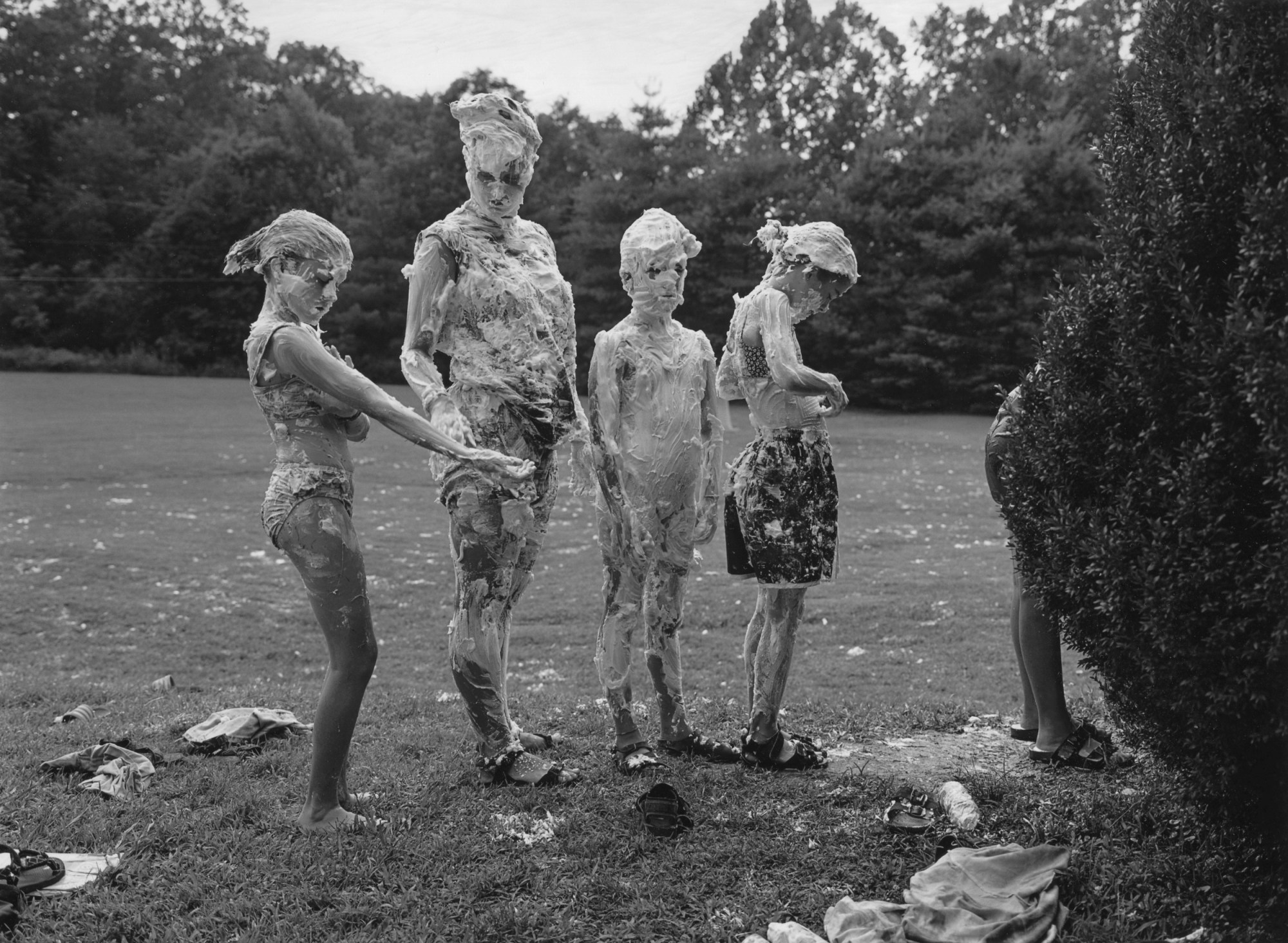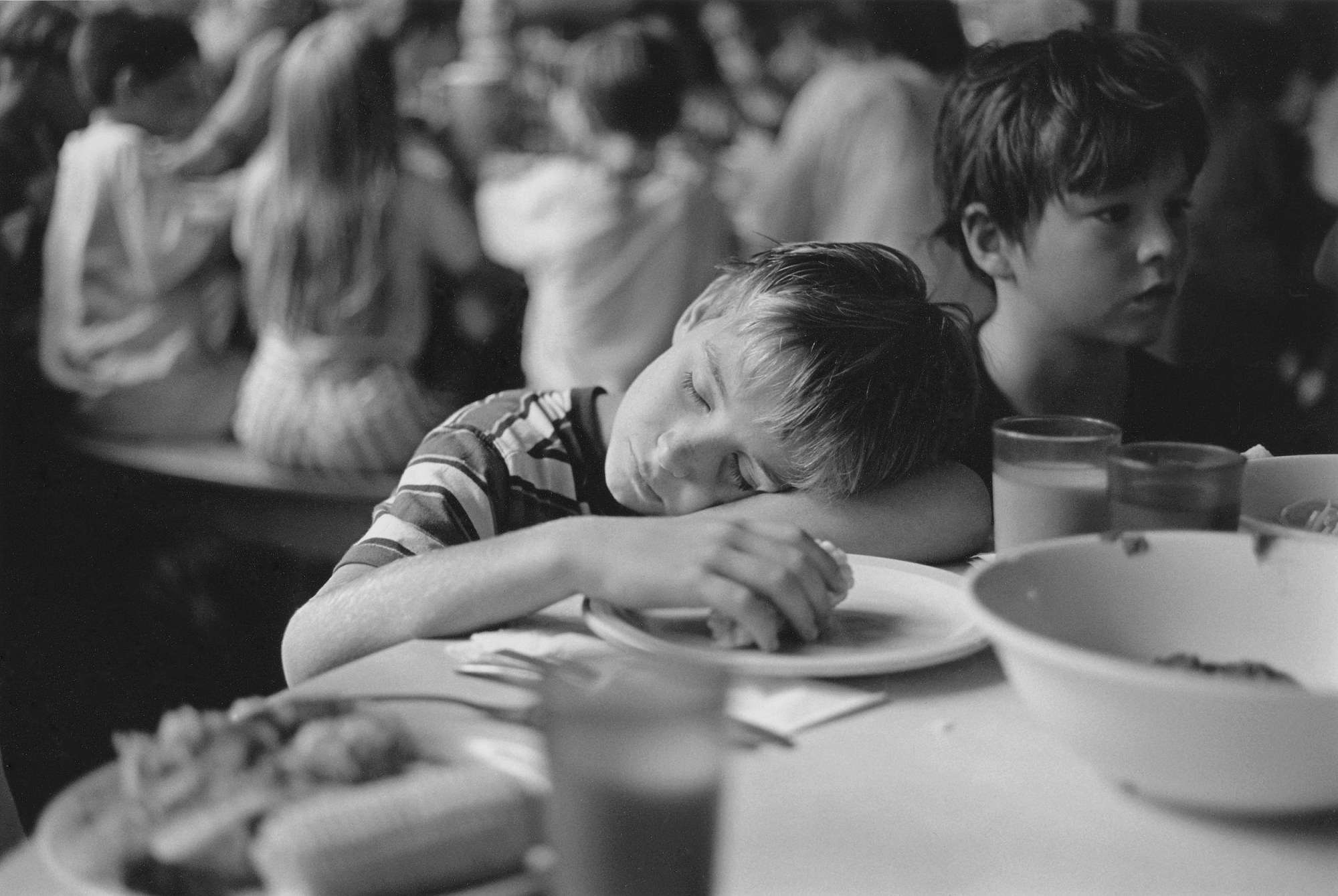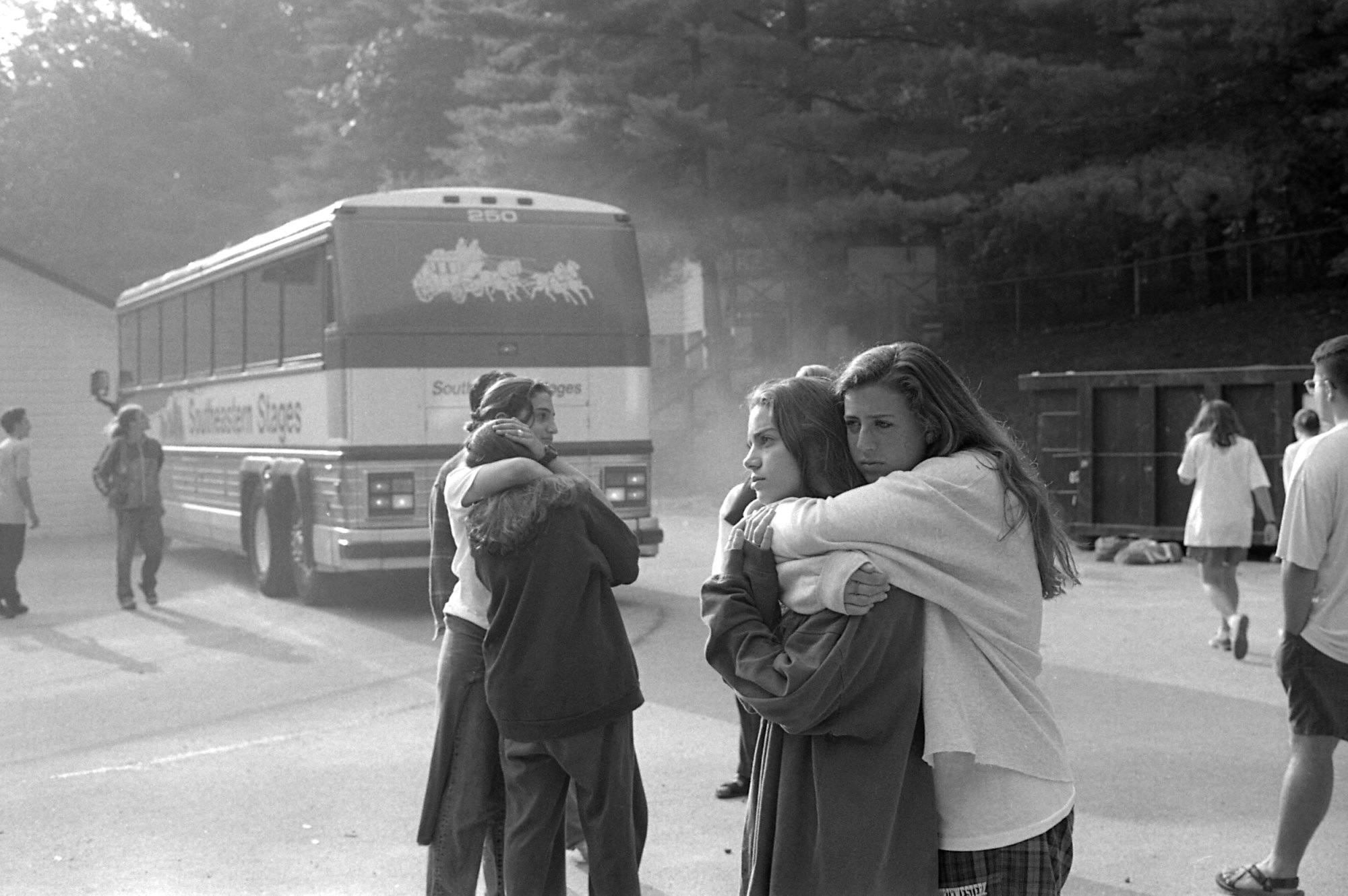From the late 80s through to the late 90s, Mark Steinmetz photographed kids at American summer camps. His dreamy, funny and deeply touching photos capture the crucial moment when innocent childhood transforms into messy adolescence.
The photos appear in his book Summer Camp, which is being reprinted after selling out almost immediately during its initial run. The kids in Steinmetz’s photos are stumbling through physical challenges like swimming and rock climbing, while also experiencing the emotional upheaval of their changing bodies and social lives. Bullies become friends, isolation leads to introspection, and they are away from their moms and their TVs for the first time.
These photos span two decades but they flow seamlessly together to tell the same story – what it’s like to transcend the simplicity of childhood, into the turbulent time of adolescence.
Hi Mark! How long have you been working on this collection?
I started it in 1986 and ended it in 1997. This was before everybody had a digital camera in their phone, so I could get into camps, explain what I was doing, and supply them with some photographs that they could use for their press purposes.
I suppose if you were to try and do it now it would be totally different! Where and how did you start this series?
Yeah! The first camp was in Cape Cod, in Massachusetts. I was hired to be their photographer, to do pictures for their calendars and brochures, but also to teach some photography. There was a darkroom at the camp, and we went in and made photograms with pine needles and cones and stuff like that.

At the start of this book, you included a letter you wrote to your parents from camp when you were eight years old. Did your experiences as a kid at camp have an impact on your desire to pursue this project all these years later?
Sure! For whatever reason I knew I wanted to describe camps – the cabins, the screen doors, the dining halls, activities by the lake, campfires… possibly because I was familiar with it. I had those memories.
I understand you got your first camera at age six. Did you ever take photos when you were a kid at camp?
Actually, I did. I remember there was one picture that I took at a summer camp of a cloud that had a hole in it, it was like this donut shape. But I lost the negatives, so it’s just a memory. But yeah, I think I was at tennis camp and they had a darkroom there, so I was taking pictures early on, around the age of 10 or 11.
In the past you’ve described photography as “this constant looking at self, and navigating your feelings.” Something about that feels very relevant to this series, and these subjects in particular. They look very introspective.
Yeah, I think so. I identify with children. In my earlier bodies of work children were a big focus. I did a book called The Players, on kids playing baseball, and then Summer Camp, and I also put a book out recently called Carnival. That’s older than just kids, there are a lot of teenagers, but it’s sort of the same time period.

The years right before becoming a teenager are so fraught with challenges. You’ve said, “There’s a kind of grave maturity developing at around 11 years old,” and in a lot of these photos the kids do look really serious. Did you get the sense, while you were photographing them, that they were reflecting deeply? Or do you think they were just thinking about lunch?
(laughs) No, I mean, I think kids have an interior life! They’re full-fledged human beings. But they’re also learning, they’re opening up. They’re in a world of adult rules, and they’re just trying to navigate that. I think they’re in a predicament.
Definitely. They’re placed in these camps, and whether they like it or not they’re stuck there, so it’s like an imposed moment of reflection.
Yeah, I think it’s difficult for them to be away from their families and the comfort of their homes. But I also think it’s great that they’re having an experience that’s much deeper than what they’re used to – going to school, then going home and watching TV and drinking soda from the refrigerator. Here, they’re outside at night, they’re by a campfire, they see the stars, and they have an experience. Even when you’re in a cabin, it’s pretty much all screen doors. So you really have a sense for the outdoors, and a sense for the length of the night, and a sense for morning dew. I think it’s very healthy for the way human beings are put together, to be out in nature like that. Even if they’re miserable and bitching to one another throughout, by the end of the session they’re often full of tears when they leave. They’re like, “oh my god, this is ending, you’re my best friend, and this has been the most intense thing I’ve ever done in my life!”

That’s beautiful! You’ve also said that “there’s a lot of growing and learning in photography,” and I feel like that’s reflected in these photos, too. It’s like you’re growing alongside your subjects. Did you notice your work changing as much as your subjects were changing, over the 10 years or so you were working on this project?
Yeah, it changed, certainly there was some different equipment, I was trying different things, different formats. By the end I was using flash at night, and I think when I began it was pretty much all daylight. I also started doing some more medium format photography by the end. But I was also trying to not change too much stylistically, I wanted the work from one decade to match the work from another decade, so I didn’t want it to be too shockingly different.
All the photos definitely flow together. As you’ve said, “There isn’t much difference between the camps in 1990 or 1965.” The mood and the experience largely stays the same. Did you ever speak to any of the kids as you were photographing them?
Oh sure, of course! I mean, there isn’t a lot of direction given, but you know, I’m just hanging out. They’re semi-bored, I’m semi-bored, and it’s just a good way to take pictures.
You weren’t one of them, but you also weren’t one of the counsellors, so were you kind of like a friend in a way?
No, I was just another person that was a part of the camp. Everybody’s pretty focused on their activities, they’re pretty intense, whether it’s some candle-lighting ceremony, or they’re just waiting for their food and they’re hungry. So I say hello, and we chat, but I’m trying to not get in the way and just let it happen.

That makes sense, and explains why the photos are so natural. They’ve also been described as nostalgic – what are your thoughts on that? Would you describe your work as nostalgic?
I wouldn’t, although I think it does work with people’s expectations or memories of what summer camp is like. But I’m not that interested in nostalgia – usually it’s mixed with sentimentality. I think the original meaning of the word nostalgia is like ‘the sorrow of memory,’ or something. And I think the real meaning of the word doesn’t have anything to do with the way people use it, so it’s a hard word to define or talk about. But in general I’m not interested in sentimentality, so I’m not interested in nostalgia as people usually think about it. I think some of the pictures are funny and touching in different ways. But I think that’s different from nostalgia. It’s not like Happy Days and people at the diner and that kind of thing.
I agree. Do you have a favorite photo in the series?
There’s a picture of a girl crossing a bridge in the fog, and there are spiderwebs, and she’s carrying a sleeping bag. And there’s another picture of these four girls and they’re covered in shaving cream… I think there are some that stand out a bit, but in terms of my own affections, I like something very simple where not much is happening. I don’t really have words to say what’s “good” about it, but I think it’s touching.
Pre-order Summer Camp by Mark Steinmetz via Nazraeli Press.
